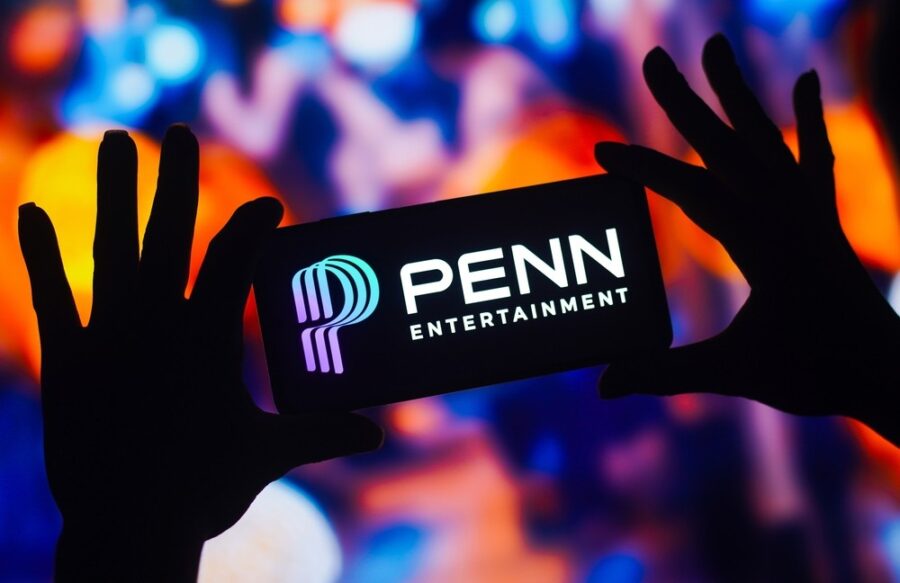Penn Entertainment and ESPN terminate agreement; operator’s OSB business to rebrand at theScore Bet

Penn Entertainment’s earnings calls have been known to include breaking news.
Whether it’s an agreement to buy Canadian-based theScore in 2021, the acquisition of Barstool Sports and the eventual decision to sell it back to Dave Portnoy in 2023, or the seemingly groundbreaking 10-year exclusive online sports betting agreement with ESPN in August 2023, Penn has been known to generate headlines.
Thursday morning, the Pennsylvania operator was at it again, announcing it was terminating its agreement with ESPN.
“I’ve been talking about this the last several quarters,” Penn Entertainment CEO Jay Snowden said during the third quarter earnings call Thursday, “that three years out, both companies are going to have to do in their best interests. And I think that we figured out a path forward, that was in both company’s best interests.”
Snowden added that there are no hard feelings between Penn Entertainment and ESPN.
“We had aspirations, we had goals to be a podium player,” he said. “It didn’t work out. And we’re moving on from that, and (ESPN) is too, and that’s, I think that’s perfectly fine.”
Penn reported revenue of US$1.72 billion in the third quarter, compared to US$1.64 billion in the same period during 2024.
Penn will rebrand its online sportsbook division in the US as theScore Bet, starting 1 December.
Snowden said that Penn Entertainment will own the database that exists and grew during it’s time with ESPN, a key point going forward. Before aligning with ESPN, Snowden acknowledged that Penn’s retail database was getting older and “we knew this is an opportunity for us to really bring the average age of our database down,” he said.
“Once you have those younger customers and new customers in your database, you want to be able to cross-sell them to your profitable land-based casino businesses,” Snowden said. “And as we’ve shared with you before, we’ve been successful in doing that, and again, that’s going to continue. It’s a very important goal for us, the cultivation of those relationships and to provide great experiences and ultimately provide monetization opportunities for the company.”
Snowden said that one benefit of the dissolution of the agreement with ESPN will be that marketing spend will decrease “significantly.”
“Most of those dollars will be redeployed to the markets and the customer cohorts … the ones that will deliver us the highest returns, primarily our business in Canada,” Snowden said. “We’ve been competing really well there, with not a lot of marketing spend, and that’s going to change. We’re going to be able to spend more money in Canada and continue to grow our share, I think, profitably there and in the icasino hybrid states in the US, those are going to be the primary markets of focus.”
“We’ve been working on this plan for a couple of months now,” Snowden added. “We’re going to know a lot more in February, and we’re going to continue to adjust our cost structure, and our marketing spend assumptions, based on what we’re seeing around retention and revenue projections as we go into 2026.”
Another benefit of terminating the agreement with ESPN is that Penn Entertainment will have more control over its future. Snowden noted the company owns its brands, database, and tech stack.
“This will enable us to better manage and forecast our digital business with greater precision, much like we have done in our regional gaming portfolio for many, many years,” Snowden said. “Penn’s unique omni channel strategy going forward is clear, compelling and growth focused. We have a high quality and extremely well-maintained portfolio of land-based properties across the country that generate the highest tax adjusted margins in the industry, along with significant free cash flow, and we have several growth catalysts over the coming quarters, coupled with less headwinds than we have seen in many years.”
During the call, Snowden addressed the increased prominence of prediction markets and how they are affecting traditional gambling operators. Snowden said such markets are a “major threat” to the gaming industry and that Penn is closely monitoring the situation.
“I do think as an industry that we’ve got to play some offense here,” Snowden said. “When I say industry, I think it’s operators. It’s working with our regulators, working with our state legislators and lawmakers, because the posture that we’re taking at this point is very defensive. It’s going to take a long time to play out, and it doesn’t feel at the moment like the winning hand.
“Prediction markets are live across the country, and I think that as an industry, we feel like we can outperform those guys if we’re in the same market as they are with the same product, i.e., sports betting. We think our sports betting product is much better than prediction markets, and I think that’s proving out.”
Snowden added that he envisions courts will be called in to address the legality of prediction markets, and whatever the outcome, there will be numerous appeals.
“Look who loses out here – customers do,” Snowden said. “There’s no responsible gaming protections, know your customer protections. All of the customer protections and regulations that we deal with, and have been for decades, those don’t exist at the at the prediction market level. So again, I think there’s a lot more to do here. I think as an industry, we need to come together and figure out how to play offense.”
,
Verticals:
Sectors:
Topics:
Dig Deeper
The Backstory
Why this turning point matters
Penn Entertainment’s decision to unwind its ESPN Bet partnership and revive theScore Bet brand marks a sharp pivot in a crowded U.S. sportsbook market. The company is exiting a costly, celebrity-branded push that aimed for a podium finish and is moving to a strategy built on products it owns, technology it controls and markets where it already has traction. That shift is consistent with management’s stated aim to lean into online casino, or icasino, and to use online sports betting primarily as a feeder for higher-value customers across retail and digital. It also underscores the limits of brand licensing in sports wagering without a clear, scalable edge in product or distribution.
The realignment follows a mixed financial picture. Penn’s regional casinos remain steady, but digital has swung between growth and heavy investment. The company is betting that an owned brand with lower media costs, unified tech and deeper cross-sell into casino can produce more durable returns than a high-profile media tie-up. The stakes are significant: reallocating capital away from a headline partnership signals a bet on margin over marketing.
The ESPN Bet buildout that was
Penn’s now-shelved ESPN Bet plan was not small. The company moved quickly to stitch together market access, sponsorships and media placement to boost adoption. In Washington, the effort included a wide partnership with Monumental Sports & Entertainment to make ESPN Bet the gaming partner of the Capitals, Wizards and Mystics, and to integrate exposure on Monumental Sports Network broadcasts. That push, detailed in Penn’s long-term partnership with Monumental, put the brand in front of a large Mid-Atlantic sports audience and aligned it with in-arena experience plans and technology activations.
At the time, the approach mirrored industry practice: use a powerful media brand to accelerate customer acquisition, layer on team and league integrations, then optimize promotions to stabilize unit economics. But customer-friendly betting outcomes and rising acquisition costs made that approach tougher. Penn’s withdrawal from the ESPN arrangement, and the rebrand timeline, suggest the company sees more value in refining a differentiated product under its own media umbrella and cross-selling within its casino network than in further subsidizing a national media presence.
Leaning into icasino and owned tech
Signals of the new focus have been building. In Michigan, Penn struck a product-first deal that gives its Hollywood Casino app exclusive early access to a new player engagement suite from Light & Wonder. The tools include the flexible Wonder Drops jackpot mechanic and a slate of promotional and multiplayer utilities. The company described the plan in two notices — the initial agreement and a launch update — that show how Penn can elevate retention and monetization in icasino without heavy brand spend. See the Light & Wonder engagement tools deal and the subsequent Michigan rollout on Hollywood Casino.
This product cadence is critical to theScore Bet relaunch. Owned tech and a shared wallet underpin smoother cross-sell between sports and casino, which tends to lift lifetime value. The company has already pressed that advantage in Canada, where theScore’s media and betting ecosystems are deeply integrated. The shift away from a rented U.S. brand to a controlled, data-rich platform suggests Penn is prioritizing product iteration, targeted promotions and cross-channel loyalty over mass-market advertising.
Financial backdrop and investor read
Recent results give context for the pivot. Penn reported higher fourth-quarter revenue year over year and narrowed its net loss, while its Interactive segment posted strong top-line growth and a full-year improvement in adjusted profitability despite a softer quarter. The company’s latest figures, outlined in Penn Entertainment revenue rises in fourth quarter, point to healthy regional properties and better icasino performance as disciplined promotions took hold. That mix matters. Icasino revenue is steadier and higher margin than sports, so a strategy that uses sports betting as a funnel while upgrading casino content can improve earnings quality.
For shareholders, the calculus is straightforward. Exiting a costly licensing deal reduces long-term cash obligations and puts emphasis on channels with clearer payback. The move also lowers brand risk tied to third-party media strategy and allows Penn to align marketing with its own customer data across retail casinos, online casino and theScore’s media audience. Analysts have framed a tighter focus on land-based and icasino as constructive if it accelerates return on invested capital.
Ontario as proof of concept
Canada offers a look at what Penn hopes to replicate. The company expanded its ecosystem in Ontario with a dedicated icasino app under theScore brand, complementing theScore Bet sportsbook, with more than one thousand games and exclusive titles such as Blue Jays Blackjack. That launch, detailed in Penn Entertainment launches theScore in Ontario, rides on the same technology that powers Hollywood Casino in the United States and exemplifies a single sign-on experience that eases cross-sell between sports and casino. It also demonstrates how a locally trusted media brand can translate into lower acquisition costs and stronger retention when paired with a robust content library.
Bringing that model stateside with theScore Bet is not a copy-paste. U.S. market dynamics vary by state and competitive intensity. But Penn’s thesis is that owned media, proprietary tech and targeted icasino investments can produce better unit economics than a national, licensed brand in sports wagering alone. The Ontario experience supports the argument that a cohesive product, consistent promotions and relevant local content can outperform heavy above-the-line spend over time.
What to watch next
The rebrand to theScore Bet will test how quickly Penn can translate Canadian lessons to U.S. states, win regulatory approvals and migrate customers without losing share. Product cadence in icasino — including further Light & Wonder feature rollouts in Michigan and beyond — will show whether engagement tools can lift monetization enough to offset reduced media spend. Watch for updates to the Hollywood Casino app’s engagement toolkit through the Light & Wonder partnership and how that content feeds into cross-sell.
Also monitor how legacy ESPN Bet partnerships transition. The Washington footprint built with Monumental Sports created visibility and access for the brand in a key market. The unwind and relaunch will reveal whether Penn can maintain those customer relationships under a new banner. If theScore Bet secures traction while icasino grows and regional casinos stay solid, the strategic reset could clarify Penn’s path to sustainable digital profitability.






